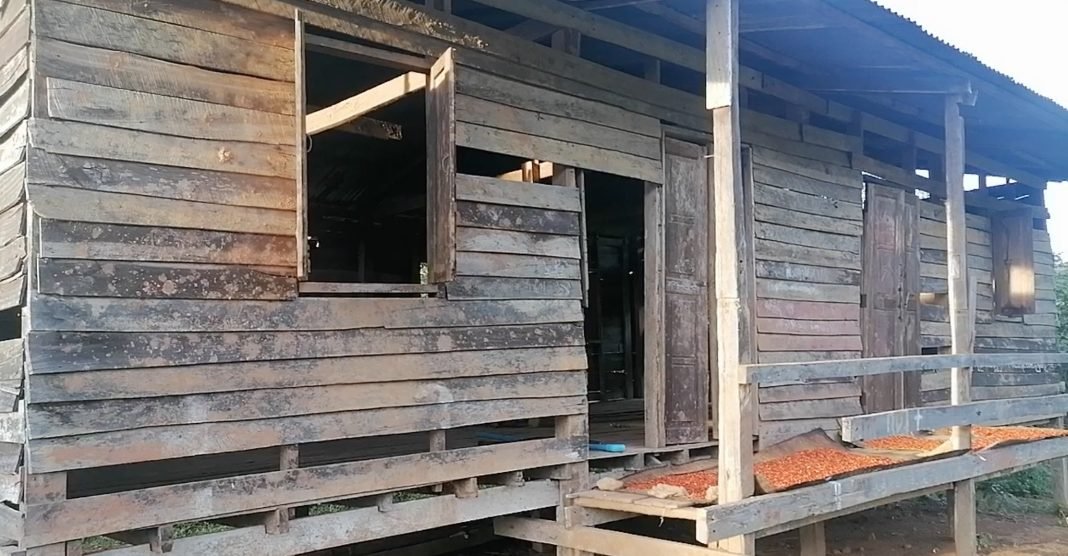Anthony
The villages in Tho Thee Pho Village-Tract, western part of Hpruso Township, are located in Kayah State where these are border villages bordering Kayin State and Shan State.
Transportation is still difficult and that village tract is lagging behind in educational development. If the school can be reopened after the COVID period, the schools would not be able to provide effective education to their children due to the lack of school supplies and furniture since the past years.
“What the school needs is there are still not enough seats. All you other needs are a desk, and the blackboards are not very good and are damaged; we need especially blackboards and seats. For fresh water, we share together with the villagers. And the toilets are built unsystematically for our teachers. Something like that. What we need is a blackboard and seats,” said U Saw Ei Kar, a local from Tho Thee Pho.
In addition, when the school is open, the classroom is divided into two sections and students (with different grades) learn in the same classroom.
“There are many difficulties in the village. There are lot of needs in education and also transportation. In terms of education, there are not enough classrooms and teachers,” said Kyaw Luizi, a youth leader from Domo Kaw village, Tho Thee Pho village-tract.
The parents of the students are not satisfied with the teaching because there are not enough teachers.
As there is no housing for the teachers on duty, the villagers have to build it with bamboo walls, so it has to be repaired every two years.
When the school open, the students who are going to graduate primary school to middle school have to continue their education at a boarding house in Kay Kaw village, a six-hour drive of motorbike from their village.
Students who are unable to stay in boarding house can no longer attend school.
Especially during the rainy season, there is a big problem for the students from Tho Thee Pho village and from other remote areas to attend school at Kay Kaw village, and their attendances become unstable, said Daw Leh Tee Shar, a primary school teacher from Kay Kaw Middle School (Sub).
“I feel like they are not fine getting around; regarding to the transportation. There are some children who attend school from Pharwel village. Some from Luday village while some from Tho Thee Pho. In the rainy season, the roads are very slippery. In our region, it rains heavily if there is a rain. Even the trees are uprooted, and the shoreline collapsed. They have to go like that even when the floodwaters from mountains recede. But when it is heavy raining, they have to absent the class and they stay in their village. They return to school only when the rain subsides,” she said.
In Kay Kaw village, even though they have up to middle school level, it is still a big challenge for middle school graduates to continue their high school education.
High school students who depend on their relatives from the city to continue their education may also encounter other challenges such as being not able to speak Burmese fluently, insufficient school fees, and inconvenient housing.
Fr-Anthony, the Catholic pastor of Kay Kaw region, said that most of the dropouts were due to failing to complete high school.
“This is a big challenge. Because there are a lot of boarders here. Most of the time, after they graduate middle school here, it is usually difficult to get another boarding house in the city because of their school fees. And mostly, they (the students) have to go and live with their relatives in the city for education. As this experience is not like boarding here, they often drop out of school because they have to live with relatives. They can not continue their education. After finishing 8th grade in the village, if you go to high school in the city, there are many children who can not continue their education. Because they do not know where to live in the city while the boarding house is also limited in number, so it is a bit difficult,” he said.
Ma Naw Htoo Wah Phaw, a resident of Tho Thee Pho who is continuing her education in Hpruso city, said that children in rural areas do not have enough seats to study because the schools in the village are not as good as those in the city.
“It’s not as good as in the city. There are only two or three classrooms here. The number of students is a bit high and there are not enough classrooms. ”
In addition, most of the areas in western part of Phruso including Tho Thee Pho Village tract has no electricity, and only battery or solar panels are used. Therefore, during the school season, the children have to do their homework under the dim light.
There are five primary schools and one sub-nursery school in the Tho Thee Pho village tract. When the school reopens, every parents is still worried about getting their children back to school in this area with full of hardship.


